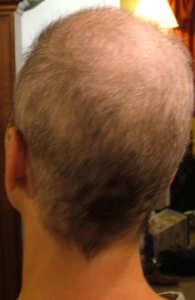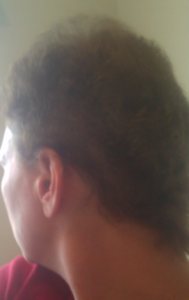This guest post to stop pulling hair out is one of the most powerful testimonials we’ve ever received. It’s from “M.”, who asked us not use her real name.
When M. first came to us, she didn’t have any hair.
This is her after 1.5 months on the program.
This is her today, after 6 months on amino acid therapy:
Here is M.’s story:
Life with Trich started for me around age 8.
My family was not very understanding and thought I was misbehaving and used to spank me, restrict me, and punish me for pulling my hair. They even went so far as to cut off all my hair and made me wear it really short stating if I didn’t want hair and would not stop pulling than I would not have hair. (see old pictures from school particularly 5th grade)
I was often mistaken for a boy and that was very painful to me.
My childhood was not the happiest because I was an outcast in my own family and really had no support or understanding. I felt alone and different enough without this added burden and thus created a very high anxiety level that I feel I maintain to this day.
I can not sit and enjoy a movie I HAVE to keep moving often times getting up from dinner to switch the clothes over in the washer or to load the dishwasher…really anything I can find to do.
I think if ADHD had been a diagnosable condition when I was in school they would have had me drugged. It might have happened anyway if my parents had understood that I could not stop pulling my hair, as it was I was responsible and something was wrong with me.
Being a survivor (had to or I would have never made it through life) I overcame by hiding my problem with hair styles and being careful where I “picked” so socially I was accepted in school. It helped that I was very athletic and friendly. I moved to Georgia the middle of my Junior year and by the time I started my Senior year was wearing a full wig.
I could not hide it with hair styles anymore. I am not sure if it was the stress of the move or that I had accepted that I was weird and trying to change was not going to help, either way most of my hair was gone.
This was also around the time I found out there was a word for my behavior “Trich”. I brought the article to my mom (dad had left by then) and she took me to a physiatrist with the articles.
I took IQ tests, personality test, etc and became his Guinea pig. He did not know anything about this condition and wanted to learn and I was his source. He put me on Prozac which I took for about 2 weeks. It made me nuts…I could not keep a thought in my head for more than a second and could not shut down my mind and rest at night.
I lied to everyone and told them I had cancer and guess what I eventually did. Then I felt like God was punishing me for lying and gave me cancer because I was using that as my excuse.
When I was undergoing treatments for the cancer I still picked. I just started picking other areas because I no longer had hair on my head. I continued using cancer as an excuse though my adult life saying that my hair never came back because the pores were closed due to the wigs I wore.
I was married for over a year before my husband ever saw me without my hair. He and everyone but one person still believes that my hair never came back after Chemo. I avoid having my family around my friends, kids and ex-husbands family as much as possible because I never want them to slip and spill the beans about why I really have no hair. It is extremely stressful maintaining the lie and lifestyle.
My life has always been and lie and I have always felt alone. I have a hard time making myself vulnerable and keep walls up, so no one can hurt me. I think my control issues, sanity issues stem from the Trich.
Once I know that there was a name for what I did, I researched and learned all I could about the illness. I used that information as my crutch whenever I felt all alone and weird. I really think learning that others have this issue helped me accept myself to a degree. This was my coping mechanism. I tried everything that came out, enrolled in all types of therapy and in secret have been looking for help since age 17.
I have finally found help in Dr. Chad and the Natural Path Health Center. I am doing well under the Amino Acid therapy. I sometimes feel anxious about when the shoe will drop and the treatment will no longer work. What will I tell everyone then, when my new found hair disappears. As time progresses I worry less and less about that. I am a worrier either by nature of as a mental side effect of all of this.
This is all so new to me and I am not sure how it will affect the rest of my life. What issues will lessen, what traits are mine and which ones are situational?
If I seek help for some of my issues will I find they are my issues or can therapy help reduce them now that the “trich” is managed.
All I know for sure is I am having the time of my life riding roller coasters, learning to scuba dive, swimming, riding with the windows down. I am going to try skydiving, a motorcycle ride, and more. All things I never allowed myself to do before because of my wig. I might even be able to open myself up to have a true relationship where I can be completely honest and not push him away because he was getting to close and might find out my secret.




My daughter recently started therapy as part of a treatment study for trich at the University of Pennsylvania overseen by Dr. Martin Franklin. Do you have knowledge of his work, and what are your thoughts? How might this compare with what you are doing?
Like any other parent of a child oppressed with this condition, I am looking for any information and possible help that is out there.
Thanks,
Elizabeth McEwen
Hi Elizabeth – I was not previously familiar with Dr. Franklin’s work, but I did some research and here is what found. It appears that Dr. Franklin is working on assessing how cognitive behavioral therapies (CBT) can positively impact trichotillomania and other anxiety and body-focused repetitive behaviors. It appears that Dr. Franklin is involved with at least two clinical trials at present. Cognitive behavioral therapies attempt to help people make emotional and behavioral changes based on the idea that a person’s thoughts cause their feelings and behaviors, not external things, like people, situations and events. The benefit of this fact is that a person can change the way s/he thinks in order to feel / act better even if the situation does not change.
Our approach focuses on the underlying biochemical imbalances that cause or greatly increase the probability of compulsive or dysfunctional behavior. In regards to trichotillomania, we have found that by identifying and addressing these underlying imbalances and giving the body the nutrients it needs to correct them (through targeted amino acid therapy), a person is able to eliminate the urge or compulsion to pull, which allows them to make the necessary adjustments to address the habit of pulling. In this regard, we have found cognitive behavioral therapies to be incredibly beneficial once a person’s neurotransmitter levels have been rebalanced. The combination of the two often leads to lasting positive change.
hello my name is carlitta and i have a pretty daughter. She started pulling out her hair at the age of 5. Now she is 8 and no more pulling out from the roots but, she tends to mess with her hair often .I continue to pray over her head and ask GOD to allow her to stop and to keep her focus on others things that enjoyable to an 8 year old little girl. See I don’t want her to miss out on the things of life just because of her hair. I thank God for websites loke this one. If you hane any questions please feel free to email me . Thank you for your listening ears.JUNE 27,2011
Thanks for your comment Carlitta,
You’ve hit on another very important component of reversing this (and many other) disorder, and that is having a positive, loving influence in one’s life. For your daughter, that includes not only your love and presence, but your faith. Both are extremely valuable influences in your daughter’s life and will undoubtedly assist her on her journey through life.
Likewise, if we can be of any assistance, please let us know.
Sincerely,
Dr. Chad